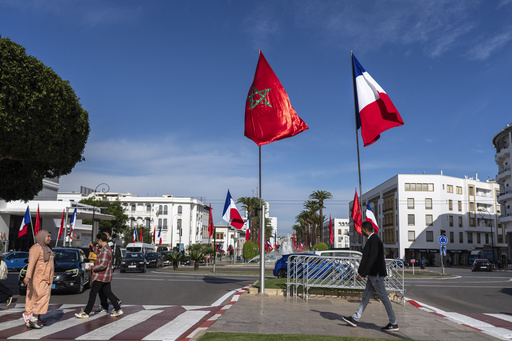
A delegation from France, alongside President Emmanuel Macron, announced new investment initiatives in the Moroccan Sahara during their visit to Morocco on Tuesday. The unveiling of these plans is part of a broader arrangement between the two nations, worth approximately 10 billion euros ($10.8 billion), which includes substantial projects focused on enhancing renewable energy and improving transportation infrastructure throughout Morocco during Macron’s three-day trip to Rabat.
In a notable address delivered at the Moroccan parliament, Macron articulated that France’s changing stance toward the Western Sahara is pivotal for fostering a new phase in the intricate and historically rich relations between France and Morocco, a former colony maintaining significant economic ties. “The future of Western Sahara can only exist within the framework of Moroccan sovereignty,” he declared, receiving applause from members of Parliament.
Approaching the topic of Morocco’s proposed autonomy for the Sahrawi people, as opposed to full independence, Macron referred to a letter he sent to King Mohammed VI in July outlining France’s position, describing this autonomy plan as the sole avenue for resolving the long-standing conflict in the region.
As Macron spoke at the International University of Rabat, he reiterated that several projects announced would take place within the disputed territory, including projects spearheaded by France’s development agency, AFD. This area consists of a former Spanish colony roughly the size of the UK, claimed by both Morocco and the Polisario Front, the latter of which is based in Algeria and controls a narrow strip of land beyond a Moroccan-constructed sand wall.
The United Nations categorizes Western Sahara as a “non-self-governing” territory and has sponsored a peacekeeping mission since a cease-fire was established in 1991, aiming for a referendum allowing the Sahrawi people to determine their future. Despite this, disputes over eligible voters have stalled any such vote, leading Morocco to introduce its autonomy plan in 2007. The issue, largely overlooked outside northwestern Africa, became active once again in 2020 when the Polisario Front exited the cease-fire agreement, prompting the U.N. to describe the situation as resulting in “low-level hostilities.”
During this period, Morocco increased its diplomatic efforts to gain backing for its autonomous governance plan. Historically, France has been a significant supporter of Morocco’s stance on the international stage; however, it has been slower to align with the autonomy plan when compared to countries like the USA, Israel, and Spain.
Opposition to Morocco’s initiatives comes from the Polisario Front and its key ally, Algeria, which accuse Morocco of altering the demographic and economic landscape of the disputed territory while the conflict remains unresolved.
France’s planned investments aim to reinforce Morocco’s presence in the 80% of Western Sahara that it controls. Moreover, these investments encourage individuals from other regions of Morocco to settle in the area. AFD will dedicate 25 million euros ($27 million) specifically for development in Guelmim-Oued Noun, partially located in the northern section of the disputed territory.
In a bid to strengthen bilateral relations, Macron’s visit also saw a partnership formed between MGH Energy—a French firm dedicated to reducing carbon emissions in transportation—and a Moroccan gas retailer to produce fuel near Dakhla, the second most significant city in Western Sahara. This venture will harness wind and solar energy to create green hydrogen to convert stored carbon dioxide into synthetic fuels, including renewable methanol for ships and recycled kerosene for aircraft.
This production initiative is seen as vital in helping Europe achieve its climate targets, with transportation responsible for over 20% of global carbon emissions, as reported by the International Energy Agency. MGH Energy President Jean-Michel Germa expressed that this project could revolutionize the large-scale distribution of renewable synthetic fuels generated in Morocco.
For its first operational phase, slated to begin by 2030, the company has committed to an investment of 4.8 billion euros ($5.2 billion), coinciding with the anticipated operational opening of the Atlantic Ocean port in Dakhla, aimed at enabling exports for Morocco and neighboring West African countries. However, a recent ruling from the European Court of Justice raised questions about the legality of exporting goods produced in the disputed region, asserting that agreements must involve consent from the Sahrawi people. Hence, the methods through which these French projects will comply with such legal obligations and engage with the Sahrawis remain uncertain.
